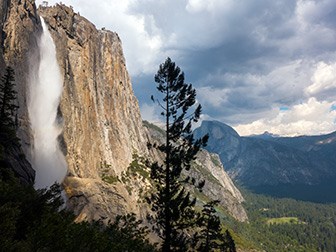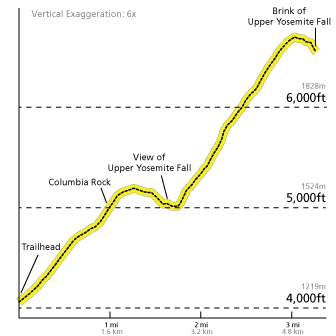|
A steep climb is well rewarded with close-up views of Upper Yosemite Fall and distant views of Half Dome and other Sierra mountain peaks. Along the hike, enjoy a bird's eye view of Yosemite Valley's meadows and the meandering Merced River.

Trail OverviewColumbia RockDistance: 2 miles (3.2 km) round trip Top of Yosemite FallsDistance: 7.2 miles (11.6 km) round trip One of Yosemite's oldest historic trails (built 1873 to 1877), the Yosemite Falls Trail leads to the top of one of North America’s tallest waterfalls, which rises 2,425 feet (739 m) above the Valley floor. This trail starts near Camp 4, along the Valley Loop Trail, and immediately begins its climb, switchback after switchback, through oak woodland. You will begin to climb above some trees and into exposed plateaus that offer you a glimpse of what's to come: great views of Yosemite Valley and its many iconic landforms. Do not stray off of the maintained path, as you will find steep drops adjacent to the trail. If you make the one-mile, 1,000 foot climb (via dozens of switchbacks) to Columbia Rock, you will be rewarded with spectacular views of Yosemite Valley, Half Dome, and Sentinel Rock. From there, it is worth the time and energy to hike another 0.5 miles (0.8 km) (some of which is actually downhill!) to get a stunning view of Upper Yosemite Fall. Depending on the season, you may even feel the mist from the fall, which may be welcome respite after the tough climb. The upper half of the trail is steep and rocky, but the arduous climb is well worth the amazing views you will be rewarded with at the top. Here you may be surprised by the small size of Yosemite Creek, which feeds this massive waterfall. Use extreme caution when near the creek and remember you are directly above a waterfall. At the top of the Yosemite Falls Trail, you can extend your hike east to Yosemite Point (follow signs for North Dome; adds 1.6 miles roundtrip (2.6 km) to this hike) or west to Eagle Peak (follow signs to El Capitan, adds 5.8 miles roundtrip (9.3 km) to this hike). Yosemite Point offers direct views of Half Dome that rival those found on the North Dome trail, gives you an opportunity to see Lost Arrow Spire up close, and provides panoramic views of many other peaks. Eagle Peak, part of the Three Brothers rock formation, is the highest point on the north rim of Yosemite Valley, which gives you a different perspective of the surrounding granite landscape. To learn more about this Yosemite icon, view a 10-minute podcast episode about Yosemite Falls. SeasonalityThe Yosemite Falls Trail is open year-round; conditions vary depending on the season. In spring, when the waterfall is at its peak, this hike is stunning, and you may even get wet from the spray of the waterfall during a section of the hike. In summer, conditions are hot and dry, and the loose decomposed granite along the trail can be slippery. Keep in mind that by August, the water levels are low and you may only see a trickle here. (Check out our Yosemite Falls webcam to see a current view.) During winter, the lower portion of this trail gets direct sunlight, so hiking can be snow-free while other trails are icy. Visiting Columbia Rock, located one mile up the trail, is a worthwhile trip at any time of year. The upper portion of this trail, which receives little to no sunlight in winter, can be very icy and slippery, or buried beneath feet of snow, making traction difficult. In winter, hiking in the colder early morning or late afternoon hours can be even more dangerous if the trail is icy. 
Stay Safe
WaterDrinking water is not available along the trail. A drinking fountain is available near the trailhead in Camp 4. Bring 4 quarts/liters of water if hiking to the top of Yosemite Falls. RestroomsRestrooms are not available along the trail; the nearest ones are in Camp 4 near the trailhead. ParkingThe Yosemite Falls trailhead is located along the Valley Loop Trail near Camp 4. The Camp 4 parking area is for campers only, but there is parking at the Yosemite Falls parking area across the street from, and just beyond the entrance to Camp 4. TransportationThe Valleywide Shuttle serves the trailhead area. Ride the shuttle to stop #7 and walk directly across the street to Camp 4 and follow trailhead signs. Trail EtiquettePets, bicycles, and strollers are prohibited. Do not shortcut switchbacks, which causes rapid trail erosion and results in injuries. Keep your food within arm's reach at all times and do not feed the wildlife. Carry out all trash and food waste (fruit peels, shells, etc.). 
Other Strenuous Hikes in Yosemite Valley<< Back to Yosemite Valley Day Hikes |
Last updated: December 29, 2024
